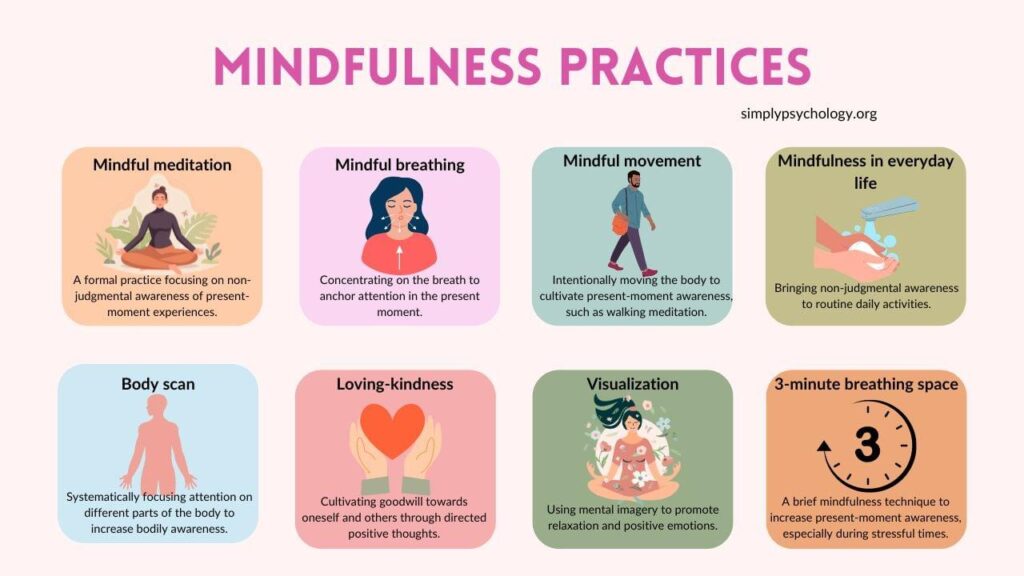In a world where the stock market often feels like a high-speed roller coaster and budgeting is about as fun as watching paint dry, it’s easy to feel overwhelmed by financial decisions. Enter mindfulness—no, not the kind that requires you to chant “Om” while levitating above your bank statements. We’re talking about practical, down-to-earth strategies to bring a little zen into your dollars and cents. In this article, we’ll explore how mindfulness can help you navigate the turbulent seas of finances with the grace of a seasoned sailor (and maybe even a few laughs along the way). Buckle up; we’re about to turn that stressful fiscal frown upside down!
Calm Your Inner Financial Beast: The Art of Mindful Spending
Picture this: You’re at the store, and that shiny new gadget is calling your name. “Buy me!” it whispers seductively. But before you surrender to its siren song, take a moment to practice mindful spending. Start by asking yourself a few key questions:
- Do I need it?
- Can I afford it?
- Will it bring joy in the long run?
Embrace being the Sherlock Holmes of your wallet. Investigate every potential purchase with the same scrutiny as a detective hunting for clues. This way, you’ll not only save money but also savor each purchase without an ounce of buyer’s remorse. Here’s a quick comparison to help you decide when to spend:
| Situation | Mindful Spending Action |
|---|---|
| 50% off sale | Ask if the 50% still fits your budget |
| Impulse buy | Wait 24 hours before deciding |
| Monthly subscription | Assess long-term value |
Stay Cool When Cash Calls: Balancing Emotions with Financial Goals
Ever get that sinking feeling when the credit card bill arrives? Or the itch to spend your savings on that one irresistible sale? We’ve all been there. But before you dive into retail therapy or panic over expenses, take a deep breath! You can balance those emotions with your financial goals, just like balancing a budget after a surprise expense. It’s not about denying your feelings; it’s about channeling them constructively. For instance, instead of letting stress control your spending, acknowledge it and divert that energy into checking off a financial task from your to-do list.
- Acknowledge your feelings without judgment.
- Channel stress into productive financial tasks.
- Focus on the bigger picture rather than short-term cravings.
| Emotion | Constructive Action |
|---|---|
| Stress | Review your budget |
| Excitement | Plan a savings goal |
| Anxiety | Seek advice |
This approach gives you a sense of control, turning financial fears and impulses into opportunities for growth. So the next time emotions run high, instead of heading straight for the checkout page, consider what productive step you can take towards your financial wellness. Just like intrepid adventurers finding treasure amidst chaos, you too can transform financial stress into savvy strategic steps!
Mindfulness Meets Bills: Turning Dreaded Payments into Zen Moments
Imagine this: you’re staring at your pile of bills and before your brain goes into full panic mode, you take a deep breath. Voilà! You are now in your Zen zone. Instead of dwelling on the dread, why not approach bill paying with mindfulness? Here’s how you can do it:
- Set the Scene: Light a candle, play some relaxing music, and create a space where you’re comfortable.
- Breathe: Take a few deep breaths. This simple action helps clear your mind and reduces stress.
- Single-Task: Tackle one bill at a time. Multitasking can scatter your focus, making the process more overwhelming.
| Mindfulness Tip | Benefit |
|---|---|
| Deep Breathing | Reduces Stress |
| Ambient Music | Enhances Focus |
| Single-Tasking | Prevents Overwhelm |
Who knew paying bills could be a meditative experience, right? By practicing these simple mindful techniques, the tension and anxiety associated with financial decisions gradually fade away. Armed with your new Zen skills, you might just find yourself looking forward to those “pay now” buttons!
The Wallet Yoga Guide: Stretching Every Dollar with Intention
Picture this: your bank account doing the splits and cartwheeling through your monthly budget without even breaking a sweat. Sounds impossible? Not with mindful financial decisions! Imagine treating your dollars like yoga poses – gentle, deliberate, and focused on balance. Just like breathing in deep during a downward dog, take a moment to breathe before a big purchase. Is it a need or a want? Will it bring you long-term joy, or just a fleeting smile?
Here's a quick breakdown to keep your finances as flexible as your favorite yoga instructor:
<ul>
<li><b>Set Intentions:</b> Just like setting an intention before a yoga session, have a financial goal in mind.</li>
<li><b>Track Your Flow:</b> Keeping an eye on your expenses is like maintaining a steady breath – it keeps you centered.</li>
<li><b>Embrace Minimalism:</b> Feel the freedom of letting go of unnecessary things and focus on what truly matters.</li>
</ul>
<table class="wp-block-table">
<thead>
<tr>
<th>Financial Yoga Pose</th>
<th>Benefit</th>
</tr>
</thead>
<tbody>
<tr>
<td>Budget Mountain</td>
<td>Stability</td>
</tr>
<tr>
<td>Savings Split</td>
<td>Flexibility</td>
</tr>
<tr>
<td>Debt Downward Dog</td>
<td>Relief</td>
</tr>
</tbody>
</table>
Q&A
Q&A:
Q1: What is mindfulness, and how on Earth does it relate to financial decisions?
A1: Mindfulness is all about being present and fully engaging in the moment without letting your mind wander to, say, what’s for dinner or that time you said something embarrassing in fifth grade. When applied to financial decisions, mindfulness helps you focus on the actual need (like sticking to a budget) rather than the want (impulse-buying that avocado toast). So no, mindfulness won’t pay your bills, but it sure can help you stop obsessively checking your bank account balance every five minutes.
Q2: Okay, but how do I actually practice this financial mindfulness?
A2: Great question! Start by taking a deep breath and recognizing that Rome wasn’t built in a day – and neither will your savings account be. Here are some steps:
- Awareness: Keep track of your earnings and spendings. Yes, even that latte.
- Budget: Create a realistic budget that includes your needs, wants, and savings. Kind of like broccoli, chocolate, and an emergency chocolate fund.
- Evaluate and Reflect: Before making a purchase, ask yourself if it’s necessary. Meditate on that sneakers purchase, do you need it or is it just calling out to your inner shoe lover?
- Patience: Stick to your plan and give yourself time to see results. Are those new headphones a necessity, or could your current ones last a bit longer?
Q3: How can I stay mindful when I’m out shopping?
A3: Ah, retail therapy, tempting but dangerous! Practice these techniques:
- Pay with Cash: It’s harder to part with physical money than swiping a card. Something about those colorful bills triggers a pain point—psychological and physical.
- Pause and Reflect: Implement a waiting period before big purchases. If by day three you’re still thinking about that must-have item, then maybe consider it. Or realize it was just an item whispering sweet temptations.
- Intentional Shopping List: Before heading out, make a list and stick to it. Do not pass go (the clearance aisle), do not collect unnecessary debts.
Q4: Can mindfulness really help curb my bad financial habits?
A4: Absolutely! Imagine your impulsive buys as that loud cousin at family gatherings. Mindfulness lets you politely say, “No thanks, not today.” Instead of binge-buying on sales, you’ll learn to focus on what adds value to your life—like a well-structured budget instead of yet another coffee mug with a quirky slogan.
Q5: Any apps or tools to help keep me on the mindful financial path?
A5: There are tons, and they’re like having a financially-savvy mentor in your pocket. Consider:
- Budgeting Apps: Tools like Mint or YNAB (You Need A Budget) help track every penny.
- Mindfulness Apps: Try Headspace or Calm to practice everyday mindfulness that isn’t just about money but will help you stay grounded overall.
- Expense Trackers: Like PocketGuard – which is great for realizing exactly why you’re mysteriously broke every month.
Q6: What’s the biggest benefit of mindfulness in financial decisions?
A6: Besides your wallet giving you a standing ovation, the biggest benefit is reduced stress. Knowing you’re in control of your finances means fewer nights lying awake wondering if your credit card bill will send your dad to an early grave. With mindfulness, achieving financial wellness isn’t just about having more money but having more peace and less “how will I eat ramen every day this week?” moments.
Q7: Any last tips for staying mindful in my financial journey?
A7: Keep it simple and celebrate small victories. Budgeting doesn’t have to be a chore—it can be as satisfying as organized sock drawers. And remember, mindful doesn’t mean miserly—allow yourself the occasional treat. Just make sure it’s a conscious choice, not a knee-jerk reaction to your boss’s latest unreasonable request.
approach your finances like a zen garden: maintain it regularly, enjoy the beauty of order, and occasionally, rake in the rewards!
To Wrap It Up
And there you have it – your guide to mastering the art of mindfulness in financial decisions. While we can’t guarantee you’ll reach enlightenment with every budgeting decision, incorporating these practices can certainly help you feel a little more Zen about your zeros and ones.
Remember, financial wellness isn’t about becoming the next Warren Buffet overnight, unless you have a secret knack for investing that you’re not telling us about. It’s all about making thoughtful choices that help you feel in control and confident about your money matters. So take a deep breath, maybe practice a little yoga for the wallet, and remember, your financial health is just as important as your physical and mental well-being.
And who knows? With a little mindfulness, you might just find yourself enjoying the process – or at least not sweating over your spreadsheet. Until next time, may your receipts be manageable and your returns as stress-free as your newfound financial Zen. Now go forth and balance those budgets with the wisdom of a financial guru and the calm of a yoga master! Namaste, and happy saving!


